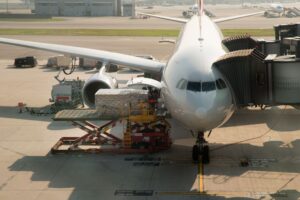Jan 09, 2024

Every day, heavy equipment that consists of construction, mining, forestry, and industrial machinery is transported all around the globe.
With a weight between 20 to at times, 1000 tons, it’s an incredible feat that these machines are capable of being transported at all, let alone by air cargo.
But with a rough 2023 and demand at historic lows, what is the future of air cargo, and how is heavy equipment shipping helping to move the industry forward?
Problems that heavy equipment shippers face
The biggest problem when dealing with heavy equipment is safety. Not only can the heavy equipment in question weigh tonnes, but at times there is potential for the item to move during transit if it is not secured properly.
Heavy equipment can potentially be worth millions, adding more risk to the equation. Heavy transport also requires a trained staff at all times that understands how to navigate moving objects that weigh up to 1000 tonnse. This can cause delays if the proper staff is not there to offload the heavy equipment in time.
Another problem that heavy equipment shippers face is the high cost that comes into play when transporting heavy equipment via airfreight. Air is not the best way to ship heavy equipment as it’s the less economical choice over sea, but there are times when deadlines must be met.
Joe Webster from A1AutoTransport says: “While air transport for heavy equipment is not our first solution for our customers, it sometimes is a necessity. A company may have a deadline and need a certain piece of equipment as soon as possible, and air transport is the only way to solve these logistical matters”.
With a high focus on safety and the necessity for efficiency during shipping to reduce costs, heavy equipment shippers have brought a new way to look at the air cargo industry as they work around the problems they face.
READ: Cutting edge cargo operations in the APAC region
A need for efficiency
With technology reshaping all industries, not just air cargo, the future is looking at integrating artificial intelligence in, whether with open arms or not.
Humans are limited when it comes to examining complex matters like supply chain logistics. When it comes to heavy equipment shipping, every second and every penny saved matters, and AI can help further the advancement of complex problems that aren’t able to be solved by the human mind.
Inefficient logistical planning can have a ripple effect, and end up costing businesses up to 25% more over the long run factoring in delays. With the ability of cost-saving algorithms, it’s now possible to think about heavy equipment shipping in a new way.
How items are transported together, what times they will be delivered, and even factoring in unpredictable events can all help bring down prices and provide a better transport experience.
For example, it may not be possible to do every single cost-benefit analysis even with a large crew, but AI can streamline this process, and make it easier for heavy equipment shippers to be more efficient, thus leading to more innovations in the air cargo space.
READ: Movu provides KDL with automation
Focus on safety
The global construction industry is set to more than double in size between 2020 and 2030, and with that statistic in mind, that means that more heavy equipment is going to need to be shipped worldwide.
With only a limited amount of people able to safely move heavy equipment, it can cause delays and fines as the shipments wait to be unloaded by trained staff.
As the demand for heavy equipment shipping increases, the airfreight industry must work towards employing more heavy equipment transportation operators to ensure safety during transit.
As these are not typical objects, and with more of them being shipped every day, the necessity for safety for the crew that is moving heavy equipment must be taken seriously as the airfreight industry advances into 2024 and beyond.
With better-trained staff, fewer incidents happen on the worksite, and fewer businesses will have to pay as more staff means fewer logistical problems down the road. Keeping everyone alive must be the priority for everyone involved in not only heavy equipment shipping, but any transport job where lives are at stake.
The post The future of air cargo: How heavy equipment is transforming air transport appeared first on AIR CARGO WEEK.
Go to Source
Author: Edward Hardy





